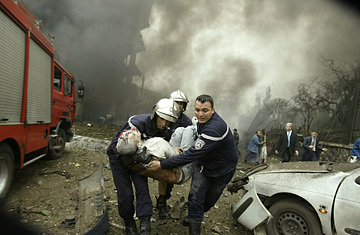
Firemen evacuate a victim of a suicide car bomb that exploded near the prime minister's headquarters in central Algiers, April 11, 2007.
Despite that pedigree, AQIM had limited its activity to relatively small strikes on Algerian police and military outposts. At the same time, France claims to have thwarted AQIM plots on its soil. "Until today," says a French counterterrorism official, AQIM's "capacity and ambition to foment terror seemed as limited in Europe as it was modest in Algeria — at least compared to the terrorist violence there before. This attack changes that view. We've always considered the group a threat, but now it's one with a terrible record."
With 15 years of a violent civil war against Islamist radicals, Algeria had attempted to preempt the dangers posed by the extremists by offering amnesties and granting religious authorities more influence in local government and social affairs. "They were hoping to buy peace at home by avoiding conflict with the AQIM," sniffs the French official. "Today's bombing was the AQIM's way of saying, 'Ha, ha — fooled you. Now you're going to pay.'"
The French look askance at Algeria's policy of accommodating Islamist sentiments (Paris also feels the same about Britain's stance, prior to 9/11, of tolerating extremist organizations as long as Islamist terror spared the U.K.). They say that Algeria's effort to "placate radicals" contributed to a chilling of relations with France — one consequence of which has been "choking off counterterror cooperation down to virtually nothing." Says the French intelligence official, "It simply gave extremists the space and time to regroup, recruit, raise money, and plan something spectacular."
Nonetheless, Algeria had been cooperating with the U.S. in anti-terror operations, allowing itself to be used in the controversial rendition program in which suspected terror operatives were held and presumably tortured in countries so as not to break any American laws. Algeria had also provided France with information that foiled a 2005 plot on French soil. The French are cognizant that a resurgent jihad in Algiers means greater danger to French interests, citizens and territory. Indeed, since December 2006, AQIM had expanded attacks from small local targets to international interests in Algeria, including the December machine-gunning of a bus full of Halliburton employees and the March bombing of vehicles transporting Russian oil industry workers. Says the French official, "If the particulars of this attack are almost surely internally Algerian, the wider consequences just as logically apply to us. We're aware of that risk and have been anticipating it. But as today shows, you can never anticipate enough."
